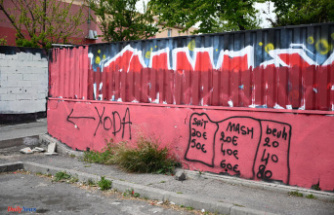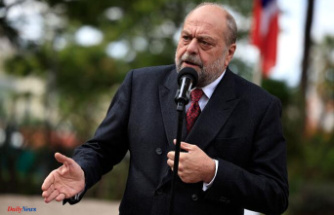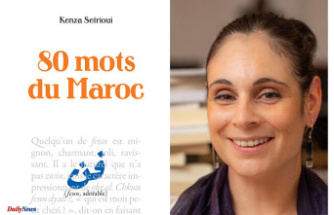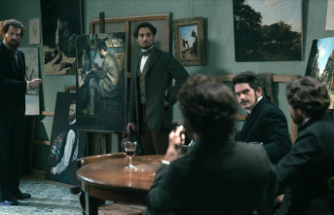In Salzburg they always have a penchant for great world theatre. "Der Jedermann", even in its now rather distorted form (when is "Die Jederfrau" coming out?) is one of those - and always sold out. Referring to the very Spanish and very Catholic poet Pedro Calderón de la Barca, in 1922 Hofmannsthal added his “Salzburg Great World Theater” as a mystery play. Perhaps because he made too much reference to the social and political crisis after the First World War?
The Italian total artist Romeo Castellucci is now responsible for mysteries at the festival, which is more than a hundred years old, and is a safe bet. Especially in a team with the conducting guru Teodor Currentzis. This time, the artistic director Markus Hinterhäuser provided the content of the game. He would like to see Bela Bartók's sombre, art nouveau twining one-act opera Bluebeard's Castle from 1918 combined as a prelude to the great, serious choral opera De Temporum Fine Comoedia, the oratorio sung in ancient Greek, Latin and German as a play from the end of the Times, which Carl Orff premiered here in 1973 as one of the younger world theater opera attempts under Herbert von Karajan. And rightly so, it has almost completely disappeared into oblivion.
Castellucci, the clever holdout, is again doing all his blacking-out work, just three weeks after his last premiere in Aix. Literally. One looks at a black hole, the Felsenreitschule as the enigmatic location of the festival is completely covered and closed by a curtain. You won't see the arcades for a moment, they aren't included, and the rest of the super humid, damp room is mostly tiring, thought-paralyzing twilight.
In it, Bluebeard (the brave Mika Kares, who is not ruggedly black) and Ausrine Stundyte, who is not only calibrated to exalted characters here, who comfortably measures the mezzo-deep Judith vocally, recreate their caricature of a dysfunctional marriage: She wants to save him, but doesn't know from what; she wants to prove herself by always looking behind new doors, revealing both beautiful and terrible things. He just wants to incorporate her into his locked away phalanx of six wives so far.
The prologue, which Bartók did not set to music, is spoken pompously in English by Christian Reiner, then Hungarian is sung. And in between, baby cries can be heard from the off, because an apparently dead baby is about to lie on the ramp. Behind it ripples water, various installations - ribbons, steles, crosses, rings are lapped by gas flames, in the middle burn "ICH" in capital letters as flaming writing of egoism, which complement each other with reflections in the wet. Judith apparently wants to kill herself with electrodes on an iron bed, puts on a glitter outfit and leaves, Bluebeard gets half-naked. Everything in the libretto is negated and not interpreted. Gender war on the back burner.
After a lengthy break in rebuilding, Orff's Oratorio of the Downfall begins. Nine sibyls, first in black, then in white on the same sample floor, screech about the apocalypse, stone a double of Judith and strangle seven children as sacrifices to the gods. Hermit monks, the anchorites, follow, chanting dully, stamping their rituals around a totem pole. Finally, the floor cloth has lifted, upside down it reads “Meine Haut”, myriads of human naked mole rats break through the parquet floor and, singing on all fours or in Ringelpiez choreographies by Cindy van Acker, achieve that even Lucifer appears again as a fallen angel accepted into the hypocritical family and granted a divine general forgiveness.
Judith and Bluebeard trudge in, hugging each other, as a meager clip of content, she places the apple of original sin in front of the devil as Eva, the last wire glows red. End of Endgame. Great cheering in the luxury-purified audience.
So far, so Salzburg-compliant. One could dismiss it as the next deluxe local installation puzzle for great Bartók and meanwhile almost indigestible Orff leftovers. And move on to the festival agenda. After the premiere is always before the premiere here, even if there are only two meager novelties waiting in the music theater.
But the presence of Teodor Currentzis, Greek with a Russian passport, and his formidable, also Russian MusicAeterna Choir, which in the Orff excellently takes on all the roles once sung by prominent soloists, which of course had been planned for a long time, it is just not - more - a purely musical one. Currentzis and its privately funded ensembles are sponsored in Russia by the sanctioned VTB Bank and by Gazprom. Putin confidants sit on the various orchestra committees. Since Currentzis' move from Perm to Moscow, its propaganda value has only really been recognized there.
That's why Currentzis has been as silent as a sphinx since February 24 in this new political situation, which is enormously difficult for him. Only the opera singer Ioan Hollaender received an interview for Servus-TV, which will be broadcast on August 4th. And the festivals? Instead of dealing discursively with this unexpected situation, they barricade themselves behind the same defensive arguments and refuse any dialogue. Markus Hinterhäuser, to his honour, defends Currentzis vehemently: This is also about art. This calculation will not add up.
Yes, before this premiere there were protests in Salzburg in Hofstallgasse, right-wing corona opponents became particularly loud when the Austrian Federal President Alexander von der Bellen moved in. Outside and inside, no one objected to the sponsorship of the festival or the employment of Russian artists. The applause remained undiminished. But Salzburg is still not doing well.
Why not become a platform here, a forum to discuss all these complex questions and get a little more clarity? Possible participants such as director Kirill Serebrennikov, expelled from Russia, were in the audience. Sure, with the motivated Gustav Mahler Youth Orchestra, Currentzis conducted a great Bartók (like Kent Nagano at the Vienna Festival under Hinterhäuser's direction) and a great, rhythmically gripping Orff, which he had previously performed in Russia. And he himself cannot speak. But we, the West, could. And what else are festivals for, if not for thinking about art and its production?
One would have liked to hear from Helga Rabl-Stadler, the former festival president who was extremely savvy in terms of sponsorship, how difficult her business is as a tightrope walk between tainted and dirty money, on which the festival is dependent due to the small state subsidies. Markus Hinterhäuser could have left out how he sees the presence of Currentzis in the future, if he succeeds in finding new financial pillars for the West without the participation of Russian musicians. Will the way he acts behind the border be tolerated?
On the other hand, how do we as an audience find it when the Russian baritone Dmitry Ulyanov earns good Western money in the Shostakovich 13th Symphony “Babi Yar”, which has also been scheduled for a long time and has now been turned into an anti-war message – Ulyanov, who posted on Facebook on February 27, 2022 , the war is a "family affair" between Russians and Ukrainians and nobody else's business? At the same time, Russians shelled the Babi Yar memorial in Kyiv and killed one of the last Ukrainian Holocaust survivors.
And what will we say when Currentzis and his own orchestra perform Shostakovich's 14th symphony on August 17? Some of his musicians have posted the most beautiful Russian propaganda photos.
Beyond the autonomy of art, there would be so much to discuss, if only not to condemn Russian artists in general terms. After all, before the opera premiere, the writer Ilija Trojanow addressed it in his opening speech: "Liars and hypocrites are not only found in Russia, they also exist in Austria, the hand-holders." In this respect, salvation is still pending, even according to Orff.












